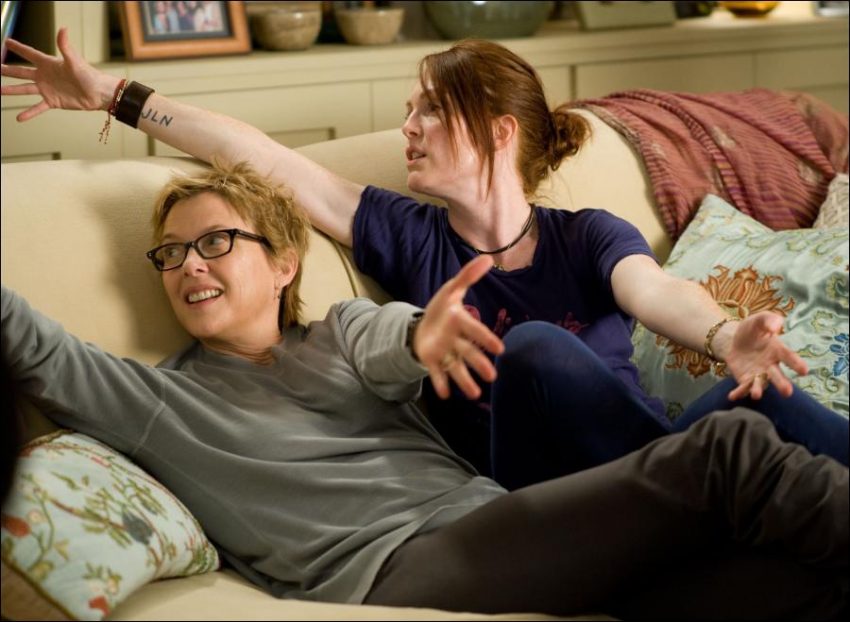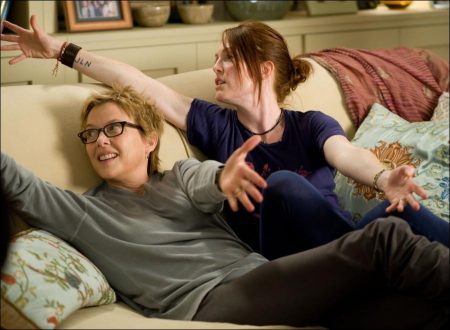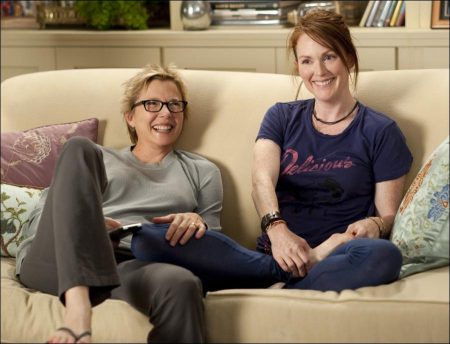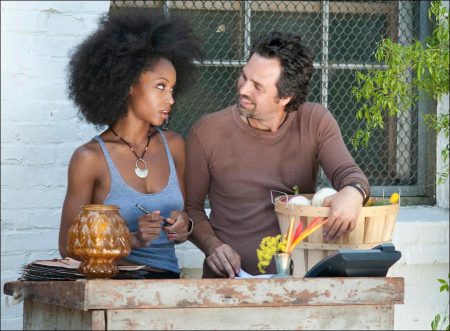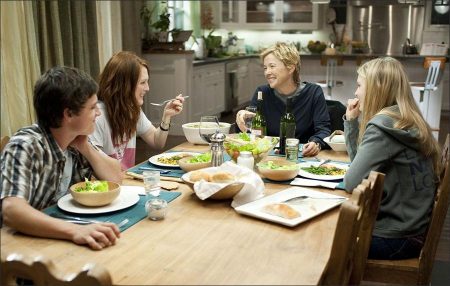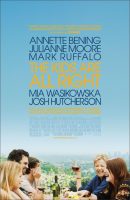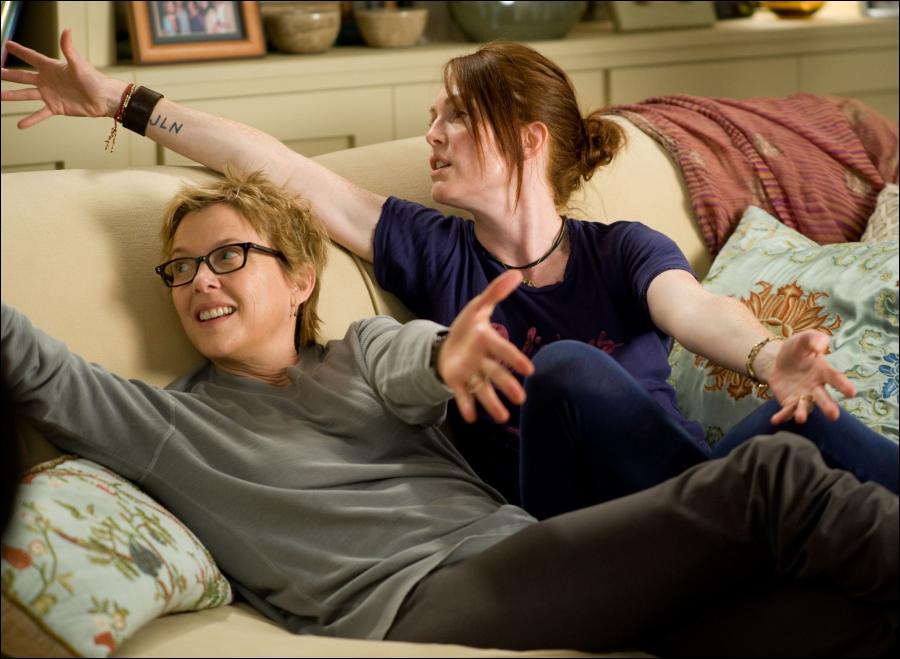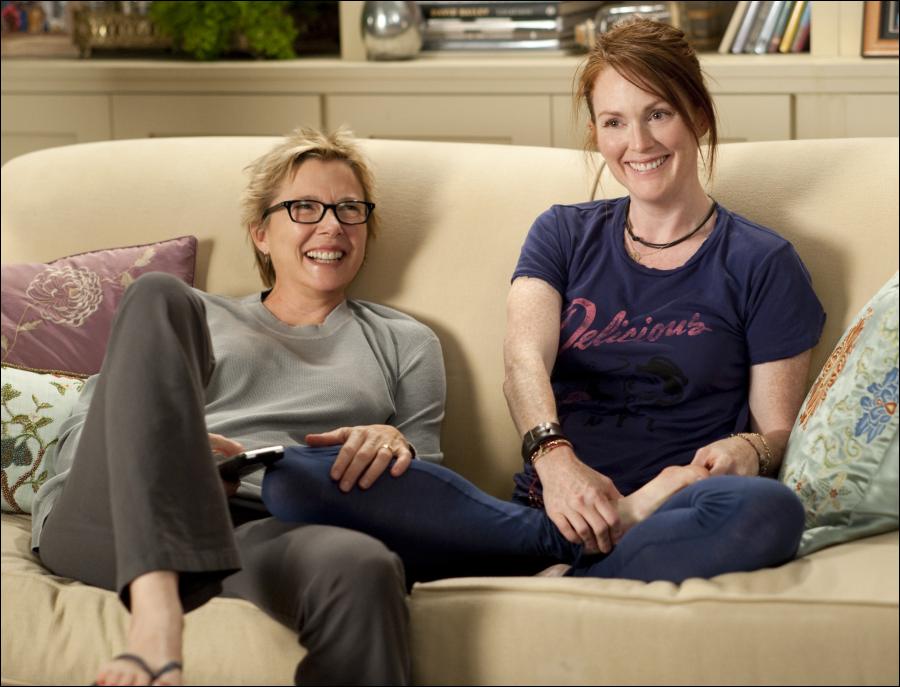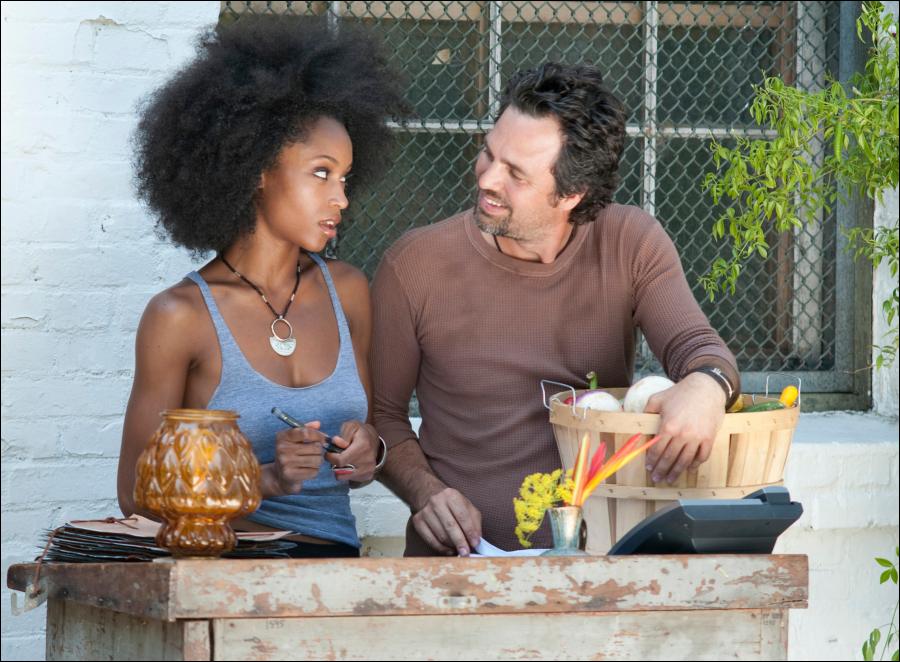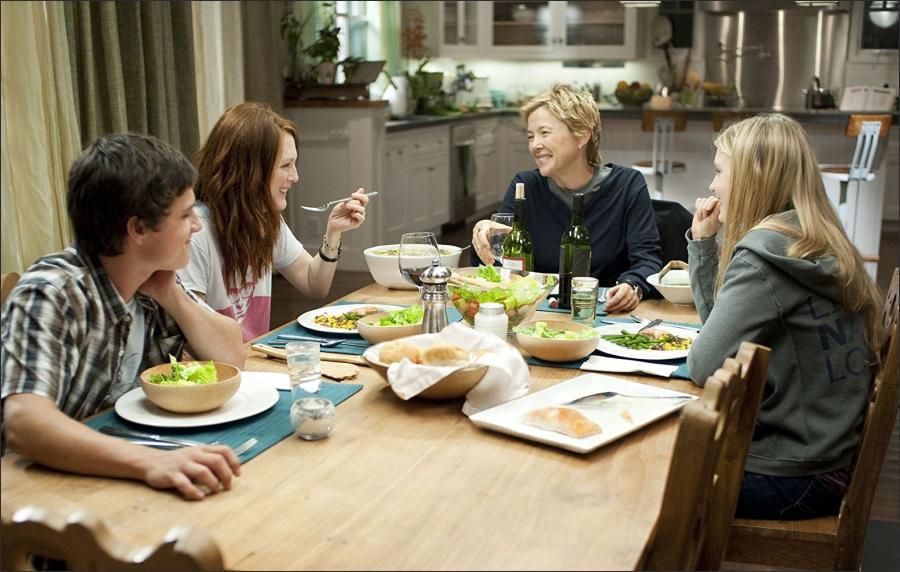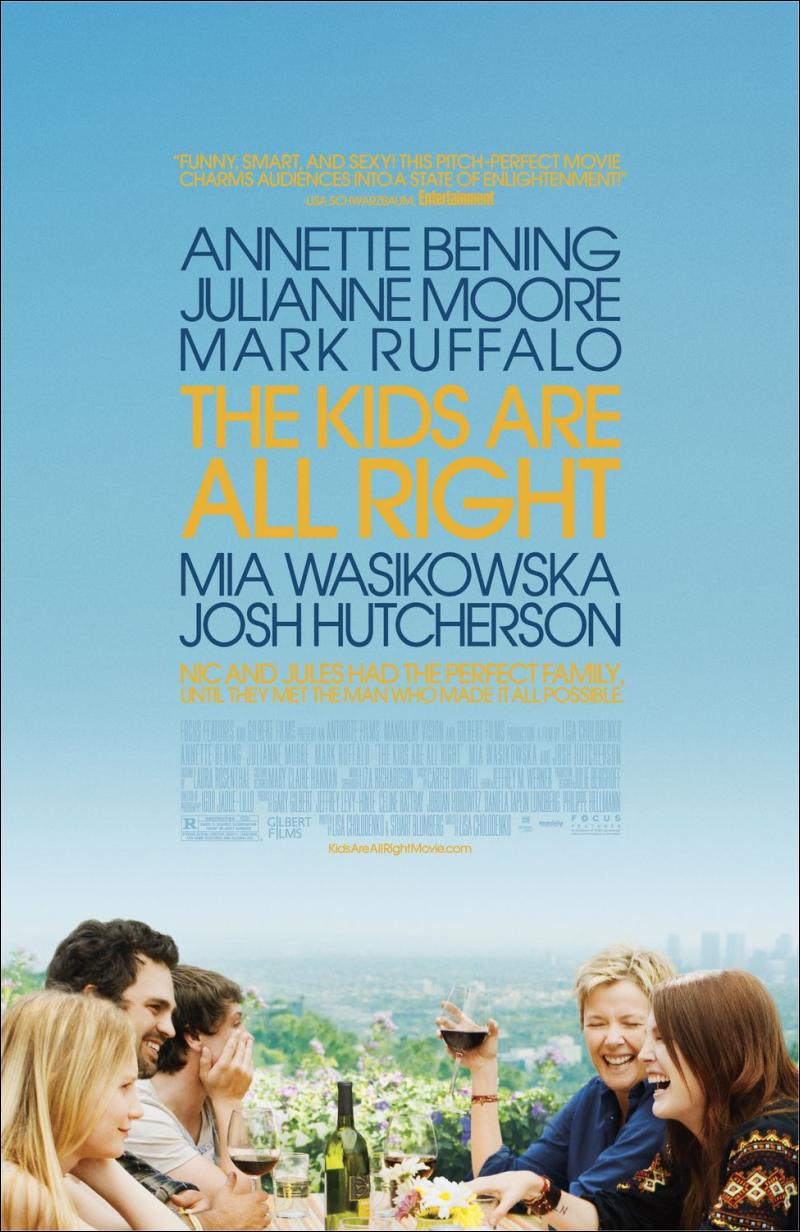Family of Four, Plus One
Annette Bening [plays Nic in the movie]: With movies, everything follows from the writing. To me, The Kids Are All Right is a great and poignant story about a family who very much love each other, and who are going through what a lot of families go through – things that we all share and can relate to. There’s so much heart in it, so much genuine feeling – and it’s not saccharine, or earnest; earnest is boring.
Julianne Moore [plays Jules in the movie]: One of the reasons that I really responded to the wonderfully funny script is that it’s about where you are when you’ve been in a relationship for a long time and you have children. Annette and I have both been married long-term, have children and know what it’s like to parent. When you have a child that’s leaving home, it’s a big transitional time for everybody.
Mia Wasikowska [plays Joni in the movie]: Family dynamics change when people grow up and start living their own lives.
Annette Bening: All the characters in the story have their journeys. Nic and Jules are really good moms; they have brought up their children in a loving, supportive environment. They’re human, like all the rest of us with our families.
The two women are very different from each other; I liked that in the writing, that they’re each such distinct people.
Julianne Moore: My character has tried different jobs; she was in architecture school, had a business, and now is trying to be a landscape designer. But she’s been more the stay-at-home parent, and for her the idea that Joni is leaving home now is major. Because her whole life has pretty much been about staying home with the kids.
It makes for a complicated dynamic. In movies, characters generally have a clear idea of where they’re going. In life, I’ve seen a lot of people who don’t. So I wanted to play that with Jules; her predicament is that she doesn’t feel like she can go forward or backward, she feels stuck – and Nic has to deal with that, they have to work it out together. I loved that Jules is at such an amorphous place in her life, and that seemed to be a compelling thing to play.
Annette Bening: I felt like I understood Nic; I saw her as a sane, stable, smart woman. The dilemma that she gets in, going through a hard thing – one of the joys of acting is trying to put yourself as much as you possibly can into the shoes of another person, and to look at the world through their eyes.
Mia Wasikowska: Nic and Jules bring out different things in Joni’s personality. To me, Joni always came off as a fiercely driven person; very ambitious, and wanting to achieve in school. She’s more involved in the life of the mind than, say, fashion.
Josh Hutcherson [plays Laser in the movie]: Laser gets along great with his moms, but when he meets Paul it’s that, he hasn’t really had any male influences in his life. At the beginning of the story, he’s the one who wants to contact his biological father.
Lisa, Julianne, Annette, Mia, and I all talked about, “What would you do if it was your kid? Would you let him meet him?”
Mark Ruffalo [plays Paul in the movie]: Paul is kind of interested in the idea of picking up where the moms have left off a little.
I feel that Laser expects more of a traditional dad, but Paul is much more eclectic. Paul doesn’t totally give up on him, but goes to where he’s getting the most responsiveness, which is from Joni.
Josh Hutcherson: Laser keeps his guard up, but Joni is more outgoing, with Paul.
Mia Wasikowska: At first, she’s very apprehensive, as it’s an unexpected relationship she finds herself in.
Mark Ruffalo: Paul has never really learned to make any real emotional connections to women, other than as f—k buddies.
Conception and Delivery
The ampersand in the credits of The Kids Are All Right would seem to indicate that you wrote this script together. Is that the case?
Stuart Blumberg [screenwriter]: We’ve been very close. Hated each other. Really liked each other. Taken naps together when we were tired.
Lisa Cholodenko [screenwriter / director]: It was a long process; it took us over four years.
SB: We’ve gone through it together. I wouldn’t call it brother/sister –
LC: Our history was, we were acquaintances for many years in New York –
SB: We always got along really well. I had met Lisa through a mutual friend, and we became friendly.
LC: We ran into each other in a coffee shop in Los Angeles, and Stuart asked what I was doing. I told him that I was writing this script, but I had just started and I was into writer’s block, and what was he doing?
[My second feature film] Laurel Canyon had been released; I was doing some [directing for] television. But I really wanted to write an original screenplay; everything that I was reading that was being sent to me was just not areas where I wanted to go. I felt that I’d already started this process of doing more personal work; where I felt comfortable was with more character-identified scripts.
SB: She said, “I want to write a mainstream movie about moms who have kids and sperm donors,” and I said, “That’s funny, because I want to do something more like [the movies] you do;” something more indie.
LC: I kind of pitched him the idea. He for his own reasons had an interest in it –
SB: I was a sperm donor in college.
LC: I had friends who had been on all sides of that equation, and my partner and I were trying to get pregnant. There had been a lot of stories about donor kids – in The New York Times, on 60 Minutes – and those kids are now coming of age. That’s a brave new world for families.
So while Stuart thought it would be fun to go for the more indie flavor, I thought it would be interesting for this project to bring in somebody who had a more commercial sensibility. We figured this could be a good marriage.
SB: Neither one of us had written anything collaboratively before.
LC: We got together the next day and decided to try.
Did you just start writing scenes, or went at it another way?
SB: We spent months on the outline, months on the first draft. We sat side by side for months on end, pounding it out together. Every single scene, character, line was reworked at least 10 times.
LC: We worked the script to the bone. We asked each other questions about these characters, shaped them, and put them into contrast with each other. When I felt like the script was veering into the superficial, or politically correct, we would rein it back in.
SB: It was an interesting dynamic; men and women are different. I loved working with Lisa. Sometimes I’d sit at the computer and be like, “Okay, I’ve only got so much time, so let’s get started,” but she’d be like, “No, no, tell me about your weekend. What happened?” “We really have to start.” “No, no, we need to process.”
LC: When I would lament to my partner that I didn’t know if the script was any good, she’d say, “Keep writing ‘til you break your own heart. If it’s resonating with you, it’s on the right track.”
Stuart and I had been writing for about a year and a half, and I was simultaneously trying to get pregnant – which I did. We thought we could make the film and get it all done before I had the baby. There was a first incarnation of the film; we tried to get the production up in 2005-2006.
The Kids Are All Right (2010)
Directed by: Lisa Cholodenko
Starring by: Mia Wasikowska, Mark Ruffalo, Julianne Moore, Josh Hutcherson, Annette Bening, Zosia Mamet, Rebecca Lawrence Levy, Sasha Spielberg, Lisa Eisner, James MacDonald, Yaya DaCosta
Screenplay by: Stuart Blumberg, Lisa Cholodenko
Production Design by: Julie Berghoff
Cinematography by: Igor Jadue-Lillo
Film Editing by: Jeffrey M. Werner
Costume Design by: Mary Claire Hannan
Set Decoration by: David A. Cook
Art Direction by: James Connelly
Music by: Carter Burwell
MPAA Rating: R for strong sexual content, nudity, language and some teen drug and alcohol use.
Studio: Focus Features
Release Date: July 7, 2010
